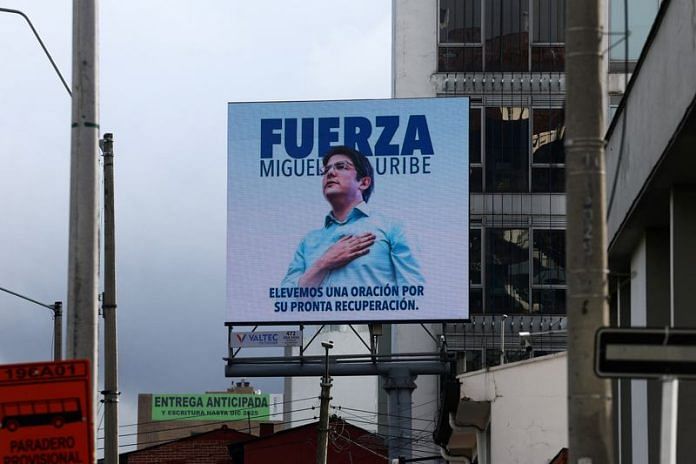By Luis Jaime Acosta
BOGOTA (Reuters) -Miguel Uribe, who died on Monday, was from a prominent Colombian political family for whom the turbulence of the country’s recent decades twice became personal tragedy.
Uribe had been vying for his party’s candidacy in upcoming presidential elections but died two months after being shot in the head at a campaign rally. He was 39.
His mother, journalist Diana Turbay, was killed in 1991 during a botched rescue mission after she was kidnapped by the Medellin Cartel, headed by drug lord Pablo Escobar. Her kidnapping and death were recounted in Colombian writer Gabriel Garcia Marquez’s 1996 book “News of a Kidnapping.”
Over 450,000 people have died and millions have been displaced in an armed conflict fueled and funded by cocaine trafficking that has lasted over six decades in Colombia.
“Violence cannot continue to mark our destiny,” said Vice President Francia Marquez on Monday in response to Uribe’s death. “Democracy is not built with bullets or blood; it is built with respect, dialogue and recognizing our differences, regardless of political position.”
Political violence has become rarer in recent years, with the government and the main rebel group, the Revolutionary Armed Forces of Colombia, reaching a peace deal in 2016. But in the 1980s and 1990s, four presidential candidates were murdered in separate attacks blamed on drug cartels allied with right-wing paramilitary death squads.
The Uribe family has long been prominent in Colombian politics. Miguel Uribe’s maternal grandfather, Julio Cesar Turbay, served as Colombia’s president from 1978 to 1982, while his paternal grandfather, Rodrigo Uribe Echavarria, headed the Liberal Party and supported Virgilio Barco’s successful 1986 presidential campaign.
‘WITHOUT SECURITY, THERE IS NOTHING’
Born in Bogota in 1986, Uribe enjoyed a rapid political rise. At 25, he was elected to the capital’s city council, where he was a prominent opponent of Gustavo Petro, now the president but then the city’s leftist mayor. He was critical of Petro’s handling of waste management and social programs.
In 2016, at 30, Uribe was appointed city government secretary, the youngest person ever to hold the position.
He resigned from that post in 2018 to launch an unsuccessful bid for mayor of Bogota as an independent.
In 2022, he was elected as a senator for the right-wing Democratic Center party, running on the slogan “Colombia First.”
In the Senate, Uribe cemented his role as one of the primary opposition voices to Petro, criticizing the government’s peace strategy aimed at ending Colombia’s six-decade armed conflict. Uribe said Petro’s strategy of pausing offensives on armed groups had backfired as peace talks failed.
“Colombia needs leadership, unity and work. Peace cannot be reached through impunity,” Uribe told fellow lawmakers in July 2024, on the opening day of the legislative session. “Only a serious security policy will incentivize criminals to lay down their arms and submit to the law.”
“Without security there is nothing.”
When he was shot, he had been running to be chosen as the candidate for the Democratic Center in the 2026 presidential election. He was not considered a likely frontrunner.
He and his wife, Claudia Tarazona, had been married for over nine years and he was stepfather to her daughters from a previous relationship. Their son together is 4.
He is also survived by his father and sister.
(Reporting by Luis Jaime Acosta; Editing by Rosalba O’Brien and Bernadette Baum)
Disclaimer: This report is auto generated from the Reuters news service. ThePrint holds no responsibility for its content.




